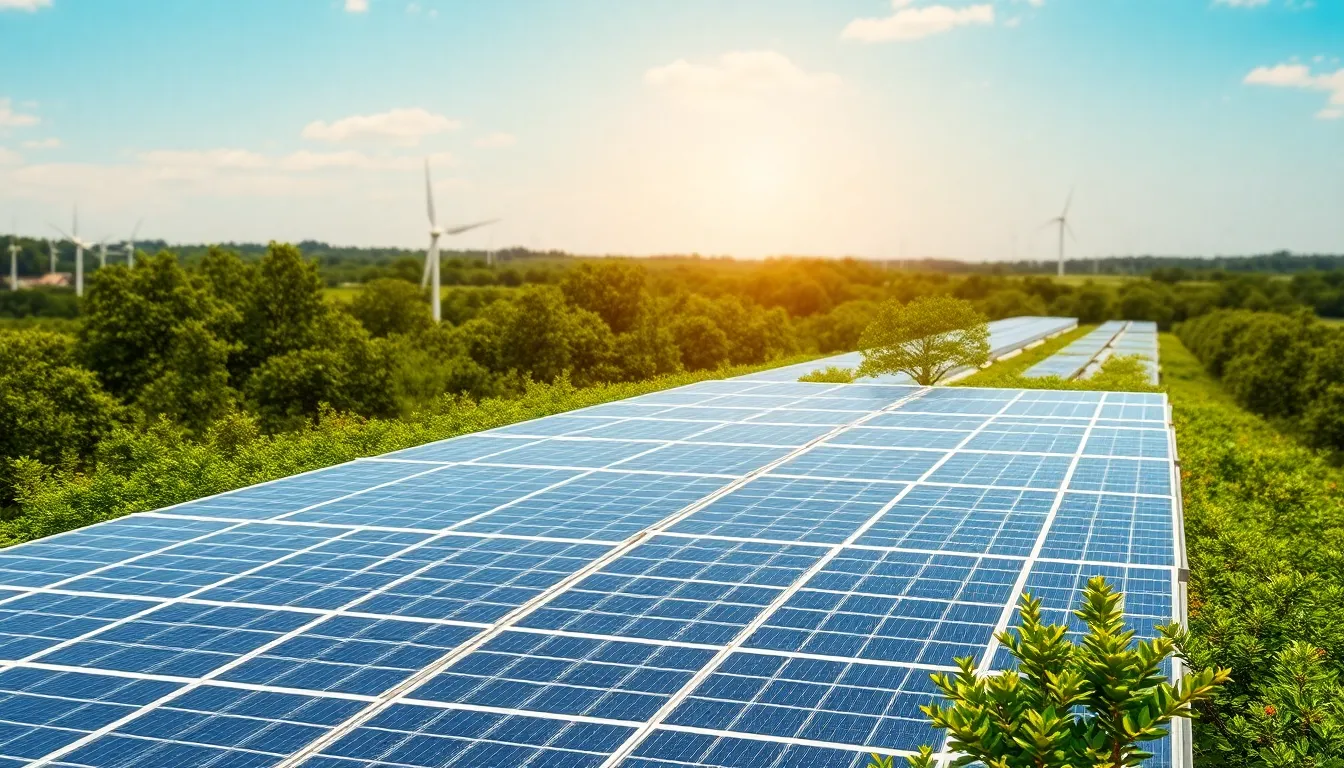In a world where energy demands are skyrocketing faster than a toddler on a sugar rush, emerging energy technologies are stepping up to save the day. Forget about the days of fossil fuels and outdated methods; innovation is here to electrify the way we think about power. From solar panels that practically eat sunlight for breakfast to wind turbines that spin like they’re auditioning for a dance-off, the future of energy is looking brighter than ever.
As the planet grapples with climate change, these cutting-edge technologies aren’t just a trend—they’re a necessity. They promise to transform how we generate, store, and use energy, making it cleaner and more efficient. So buckle up and get ready to explore the fascinating world of emerging energy technologies that are not only reshaping our energy landscape but also giving Mother Nature a well-deserved hug.
Table of Contents
ToggleOverview of Emerging Energy Technologies
Emerging energy technologies transform the energy landscape, addressing both demand and environmental concerns. Advanced solar panels offer greater efficiency and lower costs, increasing their adoption globally. Innovative wind turbines now harness wind energy with improved design and performance, making them a reliable source of electricity.
Energy storage systems, including lithium-ion and second-life batteries, enhance renewable energy integration. Electric vehicles contribute to reduced fossil fuel reliance, promoting cleaner alternatives in transportation.
Geothermal energy plays a pivotal role in sustainable heating and cooling systems. Biomass technologies convert organic materials into energy, providing a renewable solution for waste management. Hydrogen fuel cells generate power with zero emissions, making them a promising option for various applications.
Smart grids enable more efficient energy distribution, optimizing electricity use and minimizing waste. This digital infrastructure supports renewable energy sources and enhances reliability.
Carbon capture and storage technologies help mitigate the impact of existing fossil fuel plants, allowing for a gradual transition to cleaner energy. These innovations complement the ongoing shift from conventional sources to sustainable alternatives.
Artificial intelligence and machine learning enhance energy efficiency by predicting usage patterns and optimizing resource allocation. The synergy of these technologies leads to a more resilient energy system.
Investors and governments increasingly back these advancements, recognizing their potential to revolutionize energy production and consumption. As the world embraces these emerging technologies, the path to a sustainable energy future becomes clearer.
Types of Emerging Energy Technologies

Emerging energy technologies encompass a range of innovative solutions aimed at addressing energy demands and environmental concerns. Significant advancements continue to reshape this sector, promoting sustainability.
Renewable Energy Innovations
Innovative solar panels enhance energy capture and efficiency, offering improved performance even in low sunlight conditions. Advanced wind turbines, designed with larger blades and smart sensors, increase energy generation while minimizing noise and environmental impact. Other renewable technologies, like tidal and wave energy systems, harness the ocean’s power for generating electricity. Geothermal systems exploit heat stored within the Earth, providing a consistent energy source. Biomass energy utilizes organic materials, contributing to waste reduction and facilitating a circular economy.
Energy Storage Solutions
Energy storage systems play a critical role in balancing supply and demand. Lithium-ion batteries dominate the market for electric vehicles and grid applications, offering high capacity and efficiency. Second-life batteries, repurposed from electric vehicles, provide cost-effective storage options for renewable energy sources. Flow batteries and solid-state batteries emerge as promising solutions, offering longer life and higher energy density. These innovations enable the integration of renewable energy systems into the grid, supporting a transition to cleaner energy sources.
Impact on Sustainability
Emerging energy technologies significantly contribute to sustainable development. These innovations play a crucial role in creating eco-friendly energy solutions.
Reducing Carbon Footprint
Advanced energy technologies lead to a substantial reduction in carbon emissions. Solar panels harness energy from sunlight, generating power without releasing greenhouse gases. Wind turbines also generate electricity while minimizing pollution. Energy storage systems, like lithium-ion batteries, promote the storage of energy generated from renewables, further decreasing reliance on fossil fuels. By integrating these technologies into daily energy use, they enable a considerable decrease in individual and collective carbon footprints.
Enhancing Energy Efficiency
Innovative energy solutions enhance overall energy efficiency. Smart grids optimize energy distribution, allowing for better management of electricity supply and demand. Advanced energy storage systems increase the reliability of renewable resources, ensuring energy availability during peak times. Technologies such as artificial intelligence improve system performance by predicting energy usage patterns. Furthermore, the design of larger, more efficient wind turbine blades maximizes energy generation while minimizing resource consumption. Such advancements help create a more sustainable energy ecosystem.
Challenges and Barriers
Emerging energy technologies face various challenges and barriers that can hinder their rapid adoption. Understanding these obstacles is critical for driving innovation and facilitating transition to a sustainable energy future.
Economic Factors
Economic factors exert significant influence on the deployment of emerging energy technologies. High initial costs often deter investment in advanced solutions like solar panels and wind turbines. Access to financing remains limited, especially for startups or small companies. Market volatility affects the stability of investments in renewable energy projects, leading to uncertainty in long-term returns. Regulatory frameworks can create financial burdens, impacting the competitiveness of alternative energy sources against fossil fuels. Additionally, the lack of standardized pricing and subsidies can slow down market growth for innovative energy solutions.
Technological Hurdles
Technological hurdles present substantial obstacles to the advancement of emerging energy technologies. The integration of renewable energy sources into existing grids becomes complex when systems lack interoperability. Enhanced energy storage systems, such as solid-state batteries, experience challenges with efficiency and scalability. Reliability issues may arise with innovative technologies like hydrogen fuel cells, limiting their widespread use. Moreover, continuous developments in artificial intelligence and machine learning must align with energy systems to optimize performance. Ensuring cybersecurity in smart grids is essential to protect against potential threats and vulnerabilities, which may deter industry stakeholders from fully committing to these technologies.
Future Prospects
Emerging energy technologies promise significant advancements in sustainability and efficiency. Researchers predict that innovations like hydrogen fuel cells and advanced solar panels will play a critical role in transitioning from fossil fuels. Other solutions, such as energy storage techniques, enhance the integration of renewables into energy grids, ensuring reliability and efficiency.
Investments in electric vehicles are likely to accelerate as infrastructure improves alongside battery technologies. Innovations in electric vehicle charging systems facilitate widespread adoption, contributing to reduced emissions. Meanwhile, advancements in smart grids utilize artificial intelligence to optimize energy distribution, minimizing outages and ensuring a seamless energy supply.
Geothermal energy systems and biomass technologies hold potential for diverse energy solutions in both urban and rural areas. By continually developing these systems, energy providers can optimize sustainability while reducing waste. Market analysts emphasize that collaboration among governments, private sectors, and investors can spearhead legislative reforms, improving regulatory support for emerging technologies.
Challenges remain, however, in the form of economic viability and technological scalability. High initial costs often limit access for smaller projects, making financing a vital focus. Moreover, the need for interoperability among various energy solutions remains critical for effective integration.
Increased public and private funding signals a shifting landscape toward renewable energy. With a collective effort to address these hurdles, the energy transition can proceed more smoothly. As advancements emerge, they stand to redefine energy consumption patterns and foster a more sustainable future.
Emerging energy technologies are set to redefine the future of energy production and consumption. As the world increasingly shifts towards sustainable solutions, innovations in renewable energy will play a pivotal role in reducing carbon footprints and enhancing energy efficiency.
The collaboration between governments, private sectors, and investors is essential in overcoming the challenges that hinder rapid adoption. With ongoing advancements in energy storage, smart grids, and alternative fuels, the transition from fossil fuels to cleaner energy sources is not just a possibility; it’s an imperative for a sustainable future.
As these technologies continue to evolve, they hold the promise of a cleaner, more efficient energy landscape that benefits both the planet and its inhabitants.



